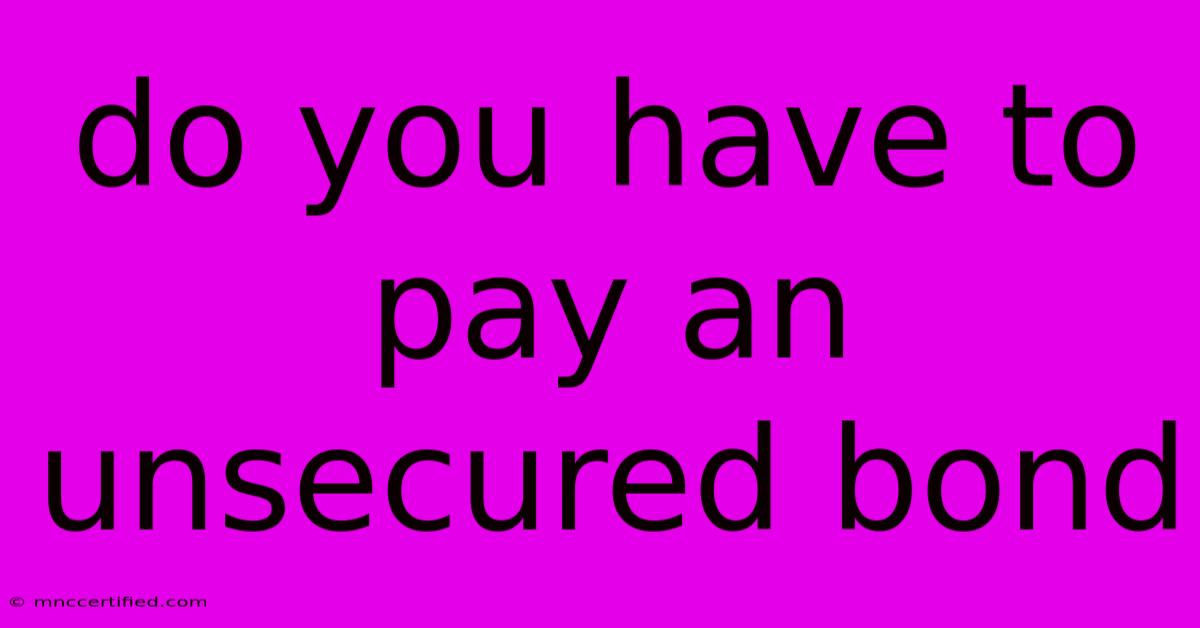Do You Have To Pay An Unsecured Bond

Table of Contents
Do You Have to Pay an Unsecured Bond?
An unsecured bond is a type of debt security that is not backed by any collateral. This means that if the issuer defaults on the bond, the bondholders have no recourse to recover their investment. So, do you have to pay an unsecured bond?
The answer is: it depends.
Understanding Unsecured Bonds
Unsecured bonds are often referred to as debentures. They rely on the issuer's creditworthiness to guarantee repayment. Investors purchase these bonds because they generally offer higher interest rates compared to secured bonds. This higher return reflects the increased risk associated with the possibility of default.
When You Might Have to Pay an Unsecured Bond
You might have to pay an unsecured bond if you are:
- The issuer of the bond: This is the most common scenario. If you issued an unsecured bond, you are legally obligated to pay back the principal amount and the agreed-upon interest rate at maturity. Failure to do so could lead to legal action and damage your credit score.
- A guarantor of the bond: If you have guaranteed the bond, you are responsible for repayment if the original issuer defaults.
When You Might Not Have to Pay an Unsecured Bond
You might not have to pay an unsecured bond if:
- The bond is already paid off: Once the bond matures and the principal amount and interest are paid, you are no longer obligated to pay.
- The issuer defaults and declares bankruptcy: In this case, the bondholders may receive a portion of their investment, but they are unlikely to receive the full amount.
- The bond is invalid: If the bond was issued illegally or with fraudulent intentions, it might be deemed invalid and you might not be required to pay.
Factors Determining Whether You Have to Pay
Several factors determine whether you are obligated to pay an unsecured bond:
- The terms of the bond agreement: This document outlines the specific conditions of the bond, including the repayment schedule, interest rate, and any potential default clauses.
- The issuer's financial stability: A company's financial health is crucial for determining the likelihood of repayment.
- The prevailing legal environment: The legal framework in your jurisdiction determines the rights and obligations of both bondholders and issuers.
Conclusion
Determining whether you have to pay an unsecured bond requires careful consideration of the specific circumstances involved. It's essential to review the bond agreement, understand the issuer's financial situation, and consult with legal professionals if needed. Always remember that unsecured bonds carry a higher risk than secured bonds, and it's important to conduct thorough research before investing.
Key Takeaways
- Unsecured bonds are not backed by collateral, making them riskier than secured bonds.
- You are likely to pay an unsecured bond if you are the issuer or a guarantor.
- You may not have to pay if the bond is already paid off, the issuer defaults and declares bankruptcy, or the bond is deemed invalid.
- Determining whether you must pay depends on the bond agreement, the issuer's financial stability, and the legal environment.
By understanding the intricacies of unsecured bonds, you can make informed decisions about your investments and mitigate potential risks.

Thank you for visiting our website wich cover about Do You Have To Pay An Unsecured Bond. We hope the information provided has been useful to you. Feel free to contact us if you have any questions or need further assistance. See you next time and dont miss to bookmark.
Featured Posts
-
Okc Loses Holmgren Currys 36 Points Win Game
Nov 11, 2024
-
Australia Vs Pakistan 8 Wicket Win For Pakistan
Nov 11, 2024
-
Real Sociedad Upsets Barcelona In La Liga Match
Nov 11, 2024
-
Live Premier League Manchester United Vs Leicester City
Nov 11, 2024
-
Insurance Special Investigation Unit
Nov 11, 2024